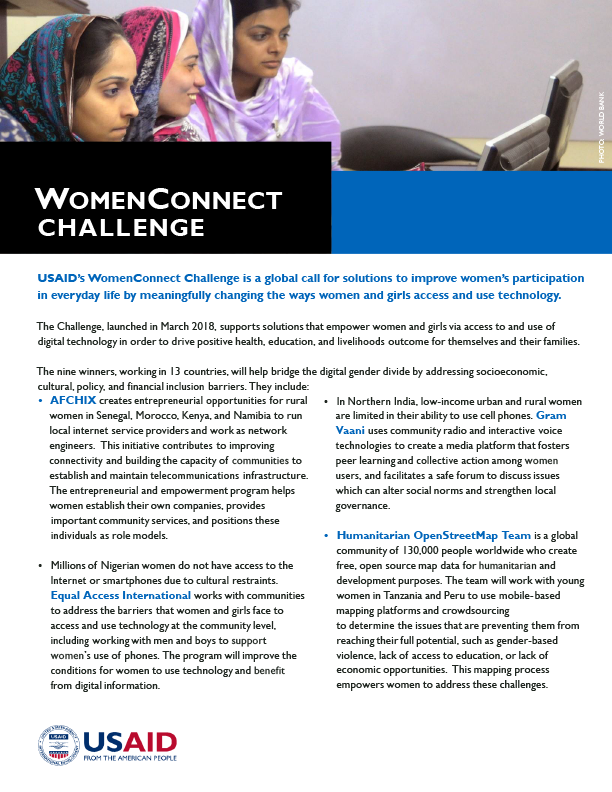Speeches Shim

USAID’s WomenConnect Challenge is a global call for solutions to improve women’s participation in everyday life by meaningfully changing the ways women and girls access and use technology.
The Challenge, launched in March 2018, supports solutions that empower women and girls via access to and use of digital technology in order to drive positive health, education, and livelihoods outcome for themselves and their families.
The nine winners, working in 13 countries, will help bridge the digital gender divide by addressing socioeconomic, cultural, policy, and financial inclusion barriers. They include:
WomenConnect Challenge Fact Sheet ![]() (pdf - 395k)
(pdf - 395k)
- AFCHIX creates entrepreneurial opportunities for rural women in Senegal, Morocco, Kenya, and Namibia to run local internet service providers and work as network engineers. This initiative contributes to improving connectivity and building the capacity of communities to establish and maintain telecommunications infrastructure. The entrepreneurial and empowerment program helps women establish their own companies, provides important community services, and positions these individuals as role models.
- Millions of Nigerian women do not have access to the Internet or smartphones due to cultural restraints. Equal Access International works with communities to address the barriers that women and girls face to access and use technology at the community level, including working with men and boys to support women’s use of phones. The program will improve the conditions for women to use technology and benefit from digital information.
- In Northern India, low-income urban and rural women are limited in their ability to use cell phones. Gram Vaani uses community radio and interactive voice technologies to create a media platform that fosters peer learning and collective action among women users, and facilitates a safe forum to discuss issues which can alter social norms and strengthen local governance.
- Humanitarian OpenStreetMap Team is a global community of 130,000 people worldwide who create free, open source map data for humanitarian and development purposes. The team will work with young women in Tanzania and Peru to use mobile-based mapping platforms and crowdsourcing to determine the issues that are preventing them from reaching their full potential, such as gender-based violence, lack of access to education, or lack of economic opportunities. This mapping process empowers women to address these challenges.
- In the Dominican Republic, low-income women disproportionately lack access to credit because they lack credit histories, property rights, and formal earnings. The Innovations for Poverty Alleviation program uses proxies from mobile phone data to uncover gender biases in the credit market in the Dominican Republic, making it possible for women to gain a credit score in order to start new businesses. Women’s access to technology is used as a means to increase access to credit and financial inclusion.
- Evidence for Policy Design India at the Institute for Financial Management and Research will develop an innovative phone-based push-pull information delivery service that provides women with mobile messages about government programs and benefits they can use. It also requests feedback about their experiences with the use of the technology as well as how to improve services that benefit them.
- In Sabalibougou, a large slum in Mali, most women have never had access to digital technology and thus are cut off from vital services and information that can help improve their health, wellbeing and autonomy. Mali Health uses a locally-developed, voice based app on a basic cell phone. This extends the reach of the numbers of women who can benefit from this appropriate, simple, and accessible solution.
- GAPI, a Mozambican Development Finance Institution, and Bluetown, an internet service provider, have joined efforts to create “Women in the Network,” an entrepreneurship program that provides rural women with technical skills courses and the ability to lease or finance phones. They help incorporate these women into the digital agricultural marketplace and gain access to income-generating activities.
- Viamo aims to tackle barriers for women such as low digital literacy, and the perception that mobile internet is not relevant to their lives. Viamo’s free, on-demand information service, 3-2-1, partners with mobile network operators to provide low-literacy women with interactive, educational content to access life-saving information and digital literacy training.
For more information about the WomenConnect Challenge, please visit www.usaid.gov/wcc


Comment
Make a general inquiry or suggest an improvement.